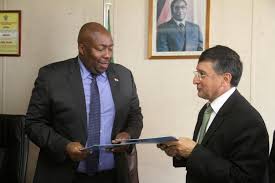By Special correspondent
The United Nations Central Emergency Response Fund (CERF) has today (Wednesday 17 May 2017) committed USD 1.6 million to assist over 32,600 flood-affected people with life-saving shelter, water, sanitation and hygiene and protection in 20 districts in Zimbabwe. This UN fund is in addition to USD 8.2 million allocated last year in response to the severe drought that affected over 4million rural Zimbabweans.
The handover ceremony was held at the Ministry of Local Government, Public Works and National Housing, Makombe boardroom, in Harare.
Dignitaries present at the handover ceremony included: Hon. Saviour Kasukuwere, Minister of Local Government, Public Works and National Housing; Senior Government Officials from the Ministry of Foreign Affairs; Office of the President and Cabinet; and senior UN Representatives led by UN Resident Coordinator Mr. Bishow Parajuli including representatives of UNICEF, UNFPA and IOM.
UN Resident Coordinator, Bishow Parajuli, who applauded the CERF support for Zimbabwe said, “The CERF fund is a critical resource that guarantees life-saving interventions in support of affected communities and I believe it will help meet the basic needs of the most vulnerable particularly those who are still living in temporary camps in the southern parts of Zimbabwe.”
“The CERF, which will be implemented by UNICEF, IOM and UNFPA together with Government Ministries, Local Authorities and Non-Governmental Organisations (NGOs), will provide life-saving interventions to over 23,800 people with water, sanitation and hygiene. Over 12,500 pupils will receive emergency education materials while over 2600 households will be provided with emergency shelter. Over 1,000 vulnerable families will receive non-food items and 2500 women will be provided with dignity and reproductive health kits,” said the UN Resident Coordinator.
The much-needed CERF support will be complemented with the World Health Organization and the Ministry of Health and Child Care health programme which has strategically pre-positioned essential drugs, kits (to manage 800 emergency cases at any given time) and personnel to contain any water- borne disease in all provinces, including in the affected areas. Rapid Response Teams are in place to conduct health-related assessments should the need arise.
Commending the strong engagement by the UN particularly in supporting the coordination of relief responses from the wider humanitarian partners in response to the national flood disaster, the Chairperson of the Cabinet Committee on Emergency Preparedness and Disaster Management, Saviour Kasukuwere said, “the Government of Zimbabwe appreciates the UN’s support provided since the onset of the disaster and the financial commitment of USD 1.6 million allocated from its emergency window funding it a true testimony of the UN’s commitment to the people of Zimbabwe .”
Following the declaration of national flood disaster at the beginning of March 2017, the Government launched a USD189 million appeal on 20 March 2017 to address the immediate, medium and long term impact of the flood disaster.
The United Nations and partners, in close consultation with the Government estimate that out of the total USD189 million, over USD20 million is needed for immediate emergency humanitarian response. The Government Special Cabinet Committee has committed USD 35 million from the Treasury for the emergency, majority of which has been assigned to infrastructure development as many parts of the country remain cut off due to damaged roads and collapsed bridges.
The Government of China has donated USD1.06 million for emergency relief. The United Kingdom’s Department for International Development (DFID) re-directed USD 990, 000 from drought response Several other development and humanitarian partners have committed additional resources, including the European Commission Humanitarian Office (USD300, 000), the Government of Japan (USD50, 000), in addition to in-kind contributions by the Government of Namibia.
USAID/Zimbabwe partners adapted some of their drought responses activities to reach tens of thousands of Zimbabweans affected by flooding since February 2017, when the floods began. USAID has also re-allocated $300,000 of its UNICEF drought response programming to provide water, sanitation, and hygiene solutions for people most affected by the floods.
The World Food Programme (WFP) has redirected food contributions from the drought response to flood-affected communities.
In response to the Government’s appeal, UN agencies, NGOs and the Red Cross Movement have been on the ground providing temporary shelter; water, hygiene and sanitation; non-food items; education materials; medicine and nutrition supplements to internally displaced people (IDPs).
Noting the large gap on resources in rebuilding roads and bridges damaged by flooding, the UN Resident Coordinator appealed to friends of Zimbabwe for their support in the ongoing rehabilitation efforts.
In line with the 2015-2030 Sendai Framework, the UN in Zimbabwe is supporting efforts to improve disaster risk reduction in all its dimensions of exposure, vulnerability and hazard characteristics; the strengthening of disaster risk governance; preparedness to “Build Back Better”; and strengthening of partnerships.
The UN in Zimbabwe recently deployed a team of experts from the UN inter-agency Capacity for Disaster Reduction Initiative who have assessed the capacity needs for strengthening disaster risk reduction efforts in the country.
Noting the new-normal of recurrent natural disasters triggered mostly by the effects of climate change, Mr. Parajuli said, “all our efforts should be geared towards building national resilience and strong contingency measures that could be rolled out in case of new emergencies, be it drought, floods or disease outbreaks.”
